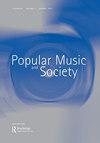人类世中的生存补丁:Go_A 2021年欧洲歌唱大赛“SHUM”表演中的忧郁和狂喜
IF 1.3
3区 艺术学
0 MUSIC
引用次数: 0
摘要
摘要本文考察了乌克兰电子民谣乐队Go_A及其为2021年欧洲歌唱大赛创作的“SHUM”多媒体表演。我们强调了Go_A的表演如何以狂喜和忧郁症的美学为特色,尽管在人类成因的晚期资本主义中正在遭受损害。我们比较了这首歌的两个版本,揭示了该团体在当地、跨地区和国际上受到欢迎的关键背景。在音乐学、生态批判、后人文主义、历史和女权主义框架的指导下,我们的分析在探索性的补丁中曲折前进,使用了诸如边界地带认识论、种间连接、凝视和超客观性等概念。这些并置揭示了“SHUM”是如何促进生态协调的生存策略的,而不是将放射性作为超对象的感官体验,如“狂野”歌唱风格和狂喜仪式的重新融合。“生存”在这里被理解为一种抵抗形式,它避开了新自由主义韧性的陷阱。最终,通过参与式美学,Go_a对“SHUM”的多媒体表演邀请观众想象在受损的后世界末日中生存的再生生态。本文章由计算机程序翻译,如有差异,请以英文原文为准。
Patches of Survival in the Anthropocene: Melancholy and Ecstasy within Go_A’s 2021 Eurovision Song Contest Performance of “SHUM” (ШУМ)
ABSTRACT This article examines the Ukrainian electro-folk band Go_A and their multimedial performances of “SHUM” created for the 2021 Eurovision Song Contest. We highlight how Go_A’s performances feature an aesthetics of ecstasy and melancholia despite ongoing damage within Anthropogenic late capitalism. We compare two versions of the song, exposing critical contexts for the group’s local, transmedial, and international reception. Informed by musicological, eco-critical, post-humanist, historical, and feminist frameworks, our analyses meander through exploratory patches employing concepts such as borderland epistemologies, interspecies connectivity, the gaze, and hyperobjectivity. These juxtapositions reveal how, rather than the sensorial experience of radioactivity as hyperobject, “SHUM” promotes ecologically attuned survival strategies such as the re-integration of “wild” singing styles and ecstatic rituals. “Survival” is understood hereby as a form of resistance that evades the pitfalls of neoliberal resilience. Ultimately, through a participatory aesthetics, Go_A’s multimedial performance of “SHUM” invites audiences to imagine a regenerative ecology of survival in the damaged post-apocalypse.
求助全文
通过发布文献求助,成功后即可免费获取论文全文。
去求助
来源期刊

POPULAR MUSIC AND SOCIETY
MUSIC-
CiteScore
1.10
自引率
0.00%
发文量
33
期刊介绍:
Popular Music and Society, founded in 1971, publishes articles, book reviews, and audio reviews on popular music of any genre, time period, or geographic location. Popular Music and Society is open to all scholarly orientations toward popular music, including (but not limited to) historical, theoretical, critical, sociological, and cultural approaches. The terms "popular" and "society" are broadly defined to accommodate a wide range of articles on the subject. Recent and forthcoming Special Issue topics include: Digital Music Delivery, Cover Songs, the Music Monopoly, Jazz, and the Kinks. Popular Music and Society is published five times per year and is a peer-reviewed academic journal supported by an international editorial board.
 求助内容:
求助内容: 应助结果提醒方式:
应助结果提醒方式:


